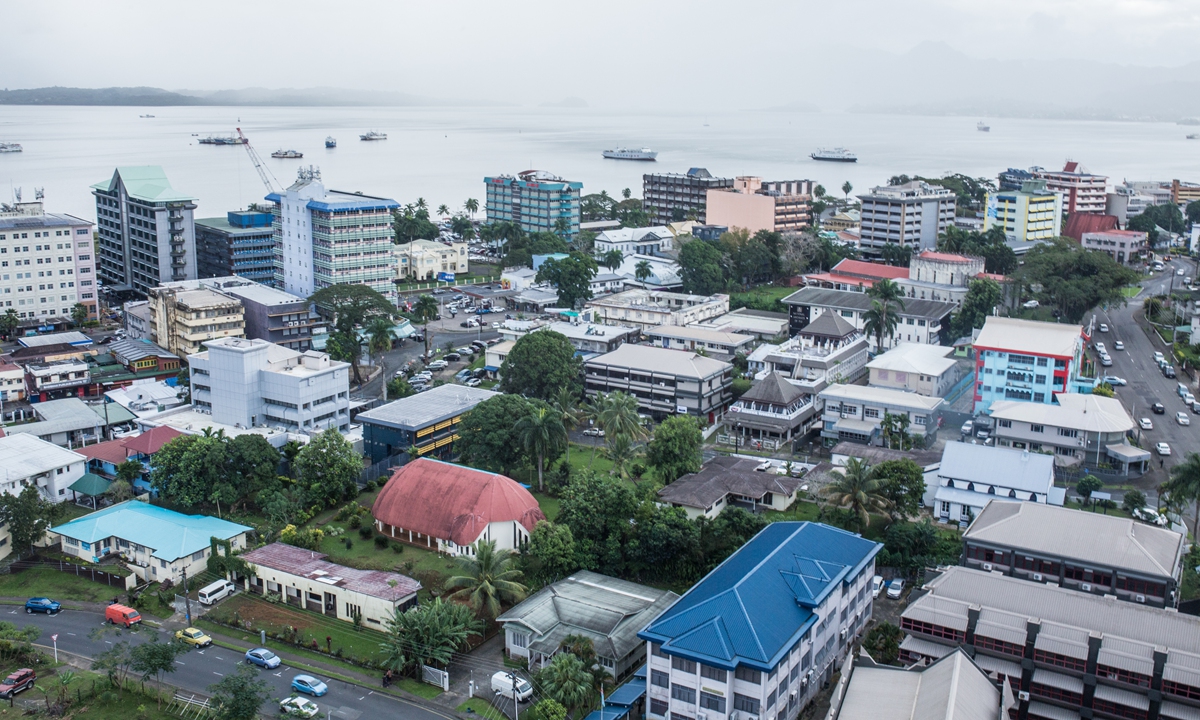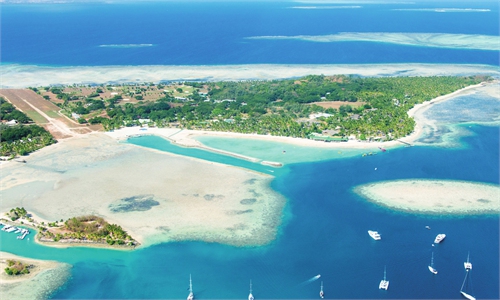South Pacific not US’ or Australia’s forbidden area; China-Fiji potential cooperation mutually beneficial: experts

A seaside scenery seen from a building built by Chinese company in Suva, capital of Fiji Photo: Shan Jie/GT
Fijian Prime Minister Sitiveni Rabuka revealed on Wednesday his intention to collaborate with China on a key port modernization and shipyard project, but the potential cooperation based on mutual respect and mutual benefit has been hyped by multiple Western media outlets that are again trying to portray China as an "aggressor."
Such accusations only show that the Western bloc, especially the US and Australia, still follow the colonial mentality, attempt to disrupt any China-related cooperation in the region, and keep it as their "forbidden area" exclusively for their gains, Chinese experts said.
They pointed out that China and Fiji, as two sovereign and independent countries, have the right to engage in cooperation for their common interests, an objective that is beyond reproach.
According to AP, Rabuka told Fiji's parliament on Wednesday his government was focused on upgrading infrastructure, "particularly the modernization of port facilities and shipyards."
"I anticipate potential collaboration with China in that endeavor, given China's globally competitive shipbuilding," he said. Reuters reported that China is the world's largest shipbuilder, accounting for half of all ships built this year.
Rabuka said on Wednesday that Beijing's Belt and Road Initiative "aligns with our nation's development agenda."
He also added that discussions were underway to address Fiji's "debt crisis" responsibly. Fiji has external debt equivalent to 56 percent of gross domestic product, most of which is owed to multilateral development banks, according to Reuters.
The Fijian leader made the remarks after he met with the Chinese leader for the first time on the sidelines of the APEC forum in San Francisco.
However, the possible cooperation between China and the Pacific island nation is being distorted by multiple Western media outlets.
Reuters, for example, quoted a chief of an Australian ship design company as saying that "The Chinese have stepped up to the plate - they are the aggressors in the Pacific, the movers and shakers." The news report, citing officials and a consultant to Rabuka on the project, revealed that Fiji previously sought Australia's involvement to build a modern ship-building facility.
China holds an undisputed world-leading position in shipbuilding and infrastructure construction, stated Chen Hong, president of the Chinese Association of Australian Studies and director of the Australian Studies Centre at East China Normal University.
Rabuka's proposal to cooperate with China in these areas is based on considerations of technological capabilities, costs, and other practical factors, all from the perspective of national interests, Chen believes.
He continued by saying that the South Pacific region has long been underdeveloped, with little attention or concern from Western countries, including Australia and the US, regarding the local infrastructure and shipping capabilities.
Now that the local island nations intend to collaborate with China, the Western bloc's attempts to exclude China from the region clearly indicate that their intentions are not genuinely aimed at assisting local economic development but only at keeping the region as their exclusive sphere of influence, Chen pointed out.
"Third-party countries have no right to interfere or make unwarranted comments," Chen said.
Western media outlets employed their typical rhetoric, trying to attach political or military motives to China's cooperation with countries in the South Pacific.
AP claimed that Fiji's move comes as China looks to "expand its influence" in the Pacific, referring to a security pact between China and Solomon Islands.
However, Beijing has made it clear that China's policy on Pacific island countries fully respects their sovereignty and independence, and does not attach political conditions or make empty promises.
In reality, it is the US and Australia that are actively engaging in military actions, such as establishing military bases and interfering in local political affairs. China, on the other hand, never attaches any political conditions and follows principles of full respect in its cooperation with the local countries.
"This is why China is welcomed in the South Pacific region," Chen stated, noting that the fact that the Western bloc always reacts so nervously and aggressively to China's cooperation with the island nations clearly demonstrates the success of the projects that China is involved in.
"In the future, there must be more mutually beneficial cooperation opportunities between China and the Pacific island nations. I'd like to advise the Western camp not to overreact or maintain a hostile attitude toward those projects," Chen added.
Experts also stressed the differences between the US and Australia in the region. Australia, as a South Pacific country, has longstanding and intricate historical and present relationships with the local island nations.
China acknowledges and respects the complex relationship Australia has established in the South Pacific region over the years, and is willing to cooperate with Australia in the region, Chen said.
However, the US, an external force that engages in political manipulation in the region, is clearly driven by its hegemonic motives.
Chen urged Australia to realize that tightly binding itself to the US is not beneficial for its own interests in the region. On the contrary, adopting an open-minded approach, true mutual benefits and win-win outcomes can be achieved between China, Australia, and the South Pacific island nations.

